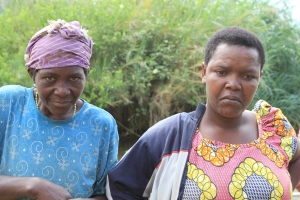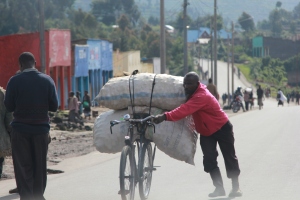 How do you forgive the atrocities of genocide? How do you live with those who committed them? If you were a perpetrator, how do you live with the survivors? And how do your live with yourself?
How do you forgive the atrocities of genocide? How do you live with those who committed them? If you were a perpetrator, how do you live with the survivors? And how do your live with yourself?
These were questions that kept surfacing during our recent trip to Rwanda. And the answers were, invariably, “We have to. It is the only way to move on.”

Rwanda is truly beautiful. Fluffy white clouds rest on the peaks of majestic, perfectly cone-shaped volcanoes. Lush rainforest shelters rare mountain gorillas. Tourists are drawn to its mysterious, misty mountains, and the clear, clean waters of its lakes.
 Twenty years after the horror of the genocide finally rasped across the consciousness of the rest of the world, Rwandans have rebuilt their country. It appears as if every square inch of arable land is being farmed; even the steepest hillsides are terraced and planted.
Twenty years after the horror of the genocide finally rasped across the consciousness of the rest of the world, Rwandans have rebuilt their country. It appears as if every square inch of arable land is being farmed; even the steepest hillsides are terraced and planted.
The undulating roads are alive with people on the move – and moving with purpose: Boys driving goats, men pushing bicycles uphill (loaded to more than twice their size with mattresses or firewood or massive bunches of bananas), women with baskets or buckets or bowls on their heads, all laden with fruit and vegetables, babies tied to their backs with colourful kitenge. There is no litter, anywhere.
Towns and villages are bustling. In the city of Kigali we found supermarkets and buffet lunches. Set away from the clamouring sprawl of traffic and commerce, the Genocide Memorial is a calm oasis. From the outside. On the inside is a record of hell.
As we moved slowly through the memorial exhibition, trying to digest the truth of that terrible 100 days, and the circumstances that led up to it, struggled to find some sort of meaning in it all. Through the blur of tears we read about colonial rule and the laws that encouraged social division and unrest. Looking for a cause, for someone to blame.
Then came a leap, – into the realm of terror and hatred. Politically manipulated, but finally, ordinary people turned against each other, transformed into brutes.
Testimony of betrayal, by neighbours, by family. Eyewitness reports of the massacre, – sadism, torture, rape, cruel mutilation and hideous death. Photographs. The devastation, the aftermath.

The statistics. The sheer scale of the tragedy. A room like a shrine, the walls papered with photos of loved ones lost.
Individual profiles of a few of the children, – their age, favourite food, what they liked playing, and how they died. Heart-rending. Multiplied by many thousands.
The comparisons: with the Holocaust, Cambodia, Bosnia, Algeria….
The inhumanity of humans.

Back out in the sunlight, we walked silently through the memorial rose gardens and past the the vast concrete mass-burial graves. We regrouped at the cafe, and along with the rich aroma of brewed Rwandan coffee, found a welcome air of hope and regeneration. Schoolchildren clustered around outdoor tables, having learnt something of their own history; in knowledge lies strength and compassion. Perhaps they are the key to forgiveness, – what makes it possible, what makes it necessary. The cafe is staffed by survivors, trained by organisation called Discover Rwanda, which also has hostels in Kigali and Gisenyi where we stayed.

 Discover Rwanda Hostel Gisenyi Fishing village on Lake Kivu
Discover Rwanda Hostel Gisenyi Fishing village on Lake Kivu
There, a young, dynamic manager told us of traumatised youths being given new hope and purpose, who, after hospitality training found longer-term employment. He talked about the seeds of the genocide being sown long before, and of his own family, together with many more Tutsis, exiled to Burundi years before, after less extensive pogroms.
We also learnt about the Gagaca courts and opportunity given to those charged with committing atrocities to admit to their crimes and ask for forgiveness. Many did, and had half their sentences reduced to community service. So now the frequent sight of convicts in orange overalls, working on the roads, was tinged with another layer of meaning.
 As a visitor, it is hard for me to understand how the community was not completely, irrevocably destroyed. It is humbling to see the evidence of forgiveness, or at least, reconciliation. The reports of heroism by ordinary people, who risked (and often lost) their lives to protect others, are inspirational. I reflect on how difficult it is for me to apologise after a petty argument, and hardly dare to put myself in the shoes of a Rwandan. Who would I be? How would I be?
As a visitor, it is hard for me to understand how the community was not completely, irrevocably destroyed. It is humbling to see the evidence of forgiveness, or at least, reconciliation. The reports of heroism by ordinary people, who risked (and often lost) their lives to protect others, are inspirational. I reflect on how difficult it is for me to apologise after a petty argument, and hardly dare to put myself in the shoes of a Rwandan. Who would I be? How would I be?
So when I hear there are rumblings of resentment bubbling away under the surface calm, I am not surprised. I only hope that the younger generation, who have been handed a tainted past, are able to build a future where there is no need for forgiveness.






Hello dear readers, – I’m afraid I must start with an apology. An advertiser has somehow inserted themselves into everything I do on my laptop, including this post. I have tried to remove the link at ‘hostels in’ and suggest you don’t click on it, – maybe it will jump onto your system as well. Any advice on how to get rid of this advertiser (actually it seems to be a whole raft of advertisers, including Mackeeper) would be very much appreciated, – it arrived when I tried to download a film. Sandy
I’m viewing you through the reader, and I can’t see an advertising link at all, so it could just be on your lappy. Have you got some software you can run to remove it?
Wonderful post, by the way. I really enjoyed the photographs and your descriptions. It’s so hard to imagine from the photographs, what went on. But so inspiring to know that the country as a whole is able to move forward.
Thanks, that’s good news about the link, I think I need to take the laptop to an expert and ask about software. And thanks for enjoying and commenting on my post. Yes, it looks so peaceful, – the dichotomy is what made the experience so hard to digest. The country has spent aid money very wisely and seem to be doing everything possible to help the healing.
Thank you for sharing. I doubt I will ever travel to Rwanda. This story reminds me of so many others were forgiveness is the hope for the future.
Thanks for your comment. Forgiveness does seem to be the answer, but so much easier said than done. I think most of us have been taught not to forgive, in the name of justice.
Beautifully written and although as an African, I was so aware of the genocide, it still makes me sick. So, I wasn’t IN the genocide, but from a distance, especially when I think of what they did to the Silverback Gorillas, it is difficult to find forgiveness. Very difficult, for me anyway.
Yes, it’s a difficult concept. With regard to the gorillas, they are awesome animals, and I support their conservation, – but their habitat will become ever more under threat as more and more people compete for the land to grow food. That’s how I saw the situation anyway, in the area around Uganda’s Bwindi Impenetrable Forest, which is not so far away from Rwanda’s Volcanoes National Park.
Yep, no active link on the ‘hostel’ detected (hope you’ve done with those malicious intruders).
Come to think of it, I’m glad the hostel and the fishing village are still the way they are on the pictures 🙂
Yes, thanks, me too! 🙂